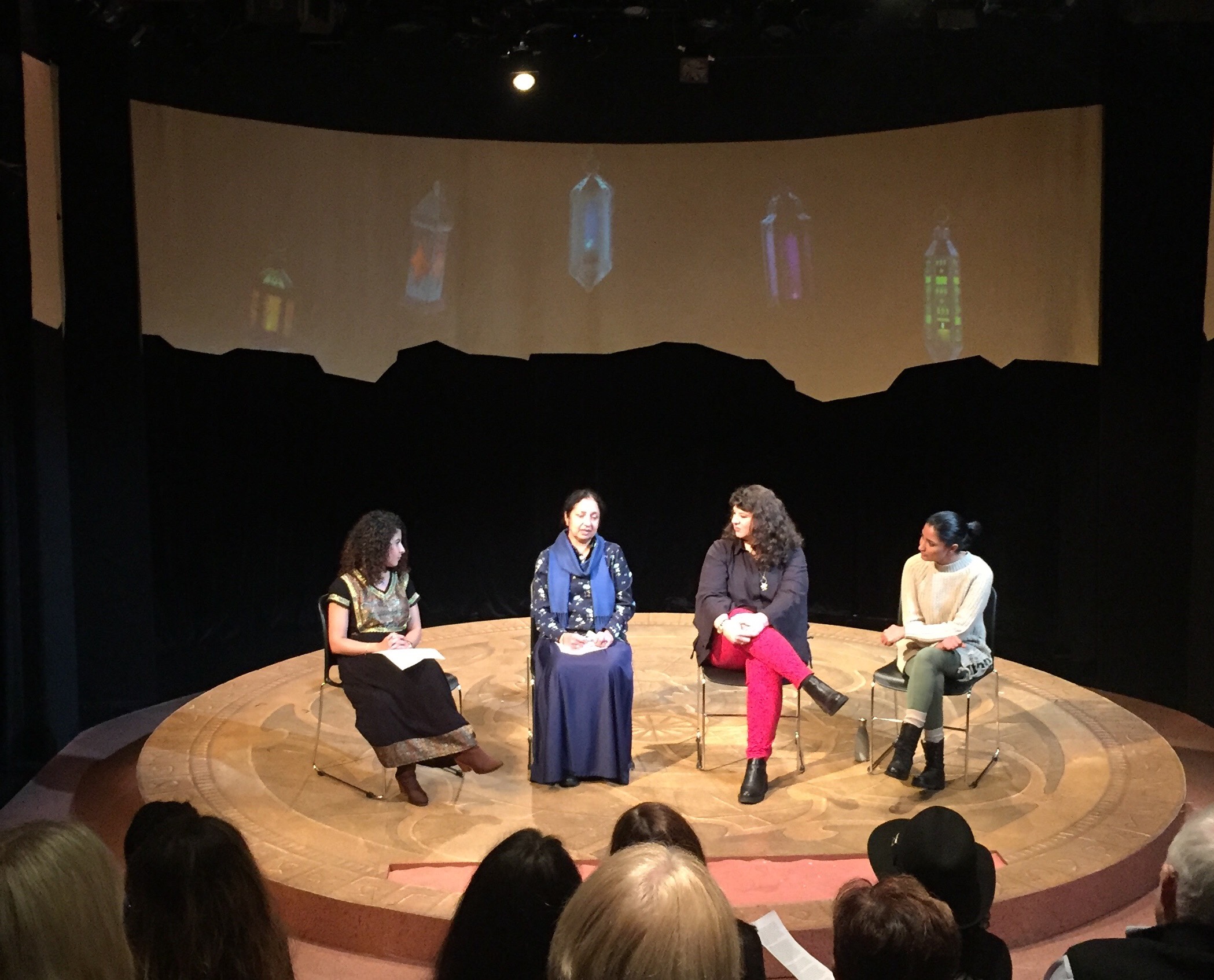This review of The Mecca Tales at The Sheen Center For Thought & Culture was written by Christopher M. Struck and published in Volume X, Issue 7 (2017) of the online edition of Applause! Applause!
The Mecca Tales
Written by Rohina Malik
Directed by Kareem Fahmy
Set Design by David Esler
Costume Design by Teresa Snider-Stein
Lighting Design by Devorah Kengmana
Sound Design by Fan Zhang
Technical Direction by Anthony Ross
Stage Managed by Keri Landeiro
Choreography by Theara J. Ward
The Sheen Center For Thought & Culture
18 Bleecker Street
New York, New York 10012
Reviewed 10/29/17
The Mecca Tales shares the five very divergent, diverse, and humanizing perspectives of unique, but representative Muslim women participating in a Hajj Pilgrimage. While the tensions among them rise and each woman came to this holy journey for a significant and particular purpose, nothing was beyond normality. These were five very normal stories of five very normal women from around the world who just happened to be Muslim. I think that was largely the point of the entire project: to show people that Muslims are just people too. What was nicer about the play was that it was relatable and entertaining to watch. Yes, there were some moments when the actors were limited by the boundaries of unrealistic or uncreative dialogue. Regardless, they were thoroughly convincing to the point that I believed all the actors must be doing this play out of a religious desire to absolve the religion of the misconceptions of secular evil. It turns out only one of the cast members was actually Muslim or of Islamic origin. Kudos to everyone for being a serious actor and acting the part.
The five women included Grace (Kimberly S. Fairbanks), the group's New York-based organizer and guide; Maya (Mariam Habib), a refugee from an undisclosed Middle Eastern country; Malika (Jade Radford), a medical student from a single-parent household; Alma (Cynthia Bastidas), a woman from Argentina whose husband is British; and Bina (Gulshan Mia), a well-off Pakistani housewife married to a successful neurosurgeon. Each of these women has their own reasons for having decided to join this travel group, which the audience learns about through flashbacks. They all hope to return "purified" from this "pilgrimage" and while they are no doubt devout Muslims making the journey for religious reasons, it doesn't prevent them from sporting "2017 Pilgrimage Tote Bags." From being turned away from their pre-paid tents by Saudi Arabian authorities to the final gesture of having a believer cut a lock of their hair and burying it in the sand, The Mecca Talesprojects an air of authenticity as the group struggles with emotional issues of grave concern to them.
Great talk back after the show!
The Hajj Pilgrimage is one of the five pillars of Islam and is meant to be performed once in the life of every Muslim. Every year, millions make the annual trek to see Mecca, which can be physically and financially demanding. Obscurity about the event and the required religious elements exists only because the specifics of the significant aspects of the trip are rarely highlighted in a brief summary of Islam. The Mecca Tales does a good job of describing or at least highlighting the various religious traditions that are meant to be completed while undertaking the Hajj. The actresses also emphasized that there should be both a purpose for undertaking the Hajj as well as a focus on the purity of one's intentions and faith for it to be "accepted."
The main dramatic arch of the play focuses on the acceptance of the ladies' Hajj. Their guide on the trip, Grace (Kimberly S. Fairbanks) is tasked with helping the women find their way while undertaking her own Hajj for the 10th time. While the women work through their various challenges, it becomes clear that Grace has some unfinished business on the Hajj. Her own business is probably the most "painful" given that it is the main one that dwells on death. Still, while most of the women's experiences are not excruciatingly painful, they are still important life challenges. Things such as never kissing a truly significant loved one or whether life will go on if one accepts her husband's divorce proposal are for some characters as serious as losing one's lover after the end of a three-hour armistice.
Grace, on the other hand, never finished her first Hajj, because she lost her son on the trip. He died giving her a message to carry on, and it took the other women on this particular trip to make her realize that she could set aside those demons of the past by completing the pilgrimage. If nothing else, it was a touching moment. The cast had me convinced that they were serious and devout Muslims, but the definitive best performance was put in by Gulshan Mia as Bina. She played a tough character very well and brought a lot of needed energy to the early scenes.
In the end, I would hope that this play continues to be performed. I think even as a piece of contemporary women's fiction, it provides a platform for engaging conversations as exemplified by the discussion panel afterward. Otherwise, it is a very easy way to learn just that little bit more about Islam. The Sheen Center is great at consistently bringing together solid performance pieces. The set and costume designs for this play were phenomenal. Keep on the lookout for more information about The Mecca Tales.

